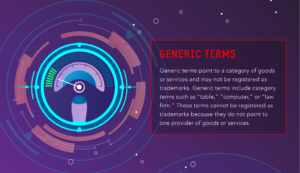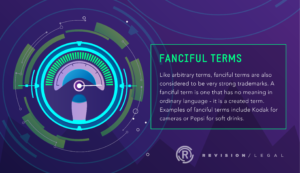Note from eFulfillment Service: We invite our partners to write for our blog, introducing our audience to new ideas, tips, advice and different points of view. Revision Legal has demonstrated expertise in helping companies protect and develop their companies, from start-up through every stage of growth.
Clients often ask us, “What are the most important first steps that I should take to be legally compliant and to protect my new e-commerce business?” Outside of the basic answers, such as create a business bank account and register a business entity to protect your personal assets, my next answer is often, “Select a strong business name and secure it with a registered trademark.” In this article, I hope to clearly explain why seeking trademark registration early in your business is important, how to select a strong business name, and what you can expect from the trademark registration process.
Why Seek Early Trademark Registration?
There are a number of reasons why it is important to seek trademark registration early on in your e-commerce business, including before building out an e-commerce website or a web store. The biggest is that it can be wildly expensive to rebrand if a trademark clearance search has not been conducted at the outset.
Consider the following recent example from our practice: A new client, who has successfully built and sold several Amazon FBA stores, purchased a domain name for a new e-commerce store. After purchasing this domain name, the client built out a new web store on top of an existing cart system at a cost of approximately $10,000. The client negotiated deals with suppliers, entered into contracts, and began buying inventory. However, the client chose to file for trademark registration through a form-filing service instead of performing a trademark clearance search, and received an office action on his trademark, which denied registration based on a likelihood of confusion with another trademark registered with the US Patent and Trademark Office.
This client came to me asking for help. His primary goal was to secure his trademark and register it with Amazon’s Brand Registry 2.0 so that he could stop his competitors from trading off of his listings. I reviewed the facts and had the unfortunate duty to inform the client that, not only was he not going to be able to obtain protection through Amazon’s Brand Registry, but he was going to need to abandon his trademark and rebrand his entire operation. Needless to say, he was not pleased.
The Strength of a Trademark
It is equally as important to select a strong name so that you can obtain trademark protection and registration. The strength of a trademark, for the purposes of protection, is measured on a spectrum. On one end are generic terms, such as “table,” “computer,” or “law firm,” which point to a category of goods or services and cannot be protected.
The second category is descriptive terms, such as “Chunky Cheese” for salad dressing or “Sharp” for televisions. The terms directly describe the goods or services sold under them and, therefore, are only capable of registration after the average consumer has come to recognize them as pointing to your goods or services.
Next are suggestive terms. Suggestive terms are slightly descriptive of the goods or services sold under them, but they require an additional “mental leap.” A good example of a suggestive term is “Microsoft,” which is a combination of microprocessor and software. It takes an additional mental leap to realize that Microsoft points to software for microprocessors, which means that it is more likely to obtain protection and registration.
The next category is arbitrary terms. Arbitrary terms are ordinary words used outside of their normal context. For example, “Amazon” when used with e-commerce services and “Apple” when used with computers are arbitrary terms. Both arbitrary terms and fanciful terms, the next category, make the strongest trademarks.
Fanciful terms are terms that have no meaning in ordinary language. Brands such as Kodak or Pepsi are fanciful terms and, therefore, make great trademarks.
Why does the strength of a term matter? Two reasons: (1) consumer recall; and (2) free speech. The US Patent and Trademark Office will be more likely to grant registration to a strong term because its job is to protect consumers from confusion. Strong terms lower cognitive search costs, which is just a fancy way of saying that they help a customer remember and reach for the same product the next time they want to buy it. Preventing against the registration of generic and merely descriptive terms helps protect against trademark overreach, because who wants to be sued for asking for an apple at the grocery store?
The Trademark Registration Process
Once a strong term has been cleared and selected, it is time to begin the trademark registration process. An application for trademark registration is filed with the US Patent and Trademark Office, or a foreign trademark office, which is then assigned to an examining attorney. The examining attorney reviews the application to make sure there are no procedural mistakes and to ensure that term contained within the application for registration does not conflict with any previously registered trademarks. This process can take anywhere from six to twelve months.
During this application process, an applicant will also have the opportunity to file for registration in other foreign jurisdictions. We often help e-commerce clients register trademarks in Canada, China, the European Union, and the UK, along with other jurisdictions. The European Union is particularly noteworthy because a single application can provide registration across multiple member states. For this reason, it is often an attractive, low cost form of protection for e-commerce merchants.
Your Brand—A Valuable Asset
It is important to clear a brand early on in the life of your business. It can often be your most valuable asset, and a great way to protect against unfair competition. Most importantly, it will help your customers keep coming back to the brand that you’ve put so much time and energy into.
John Di Giacomo is the founding partner of Revision Legal, a law firm focused on e-commerce, Internet law, intellectual property, corporate law, and international law. He has litigated matters in these areas in state and federal courts across the United States, including in front of courts of appeals and international arbitration bodies, such as the World Intellectual Property Organization, National Arbitration Forum, and South African Institute of Intellectual Property Law. John also serves as an adjunct professor of both trademark and Internet law for Michigan State University College of Law, teaching in both East Lansing, Michigan and MSU’s summer abroad program in Opatija, Croatia.
Other Blogs, Services & Articles
Keep Prime Status & Reduce FBA Costs
5 Signs You’ve Outgrown Your Fulfillment Center









